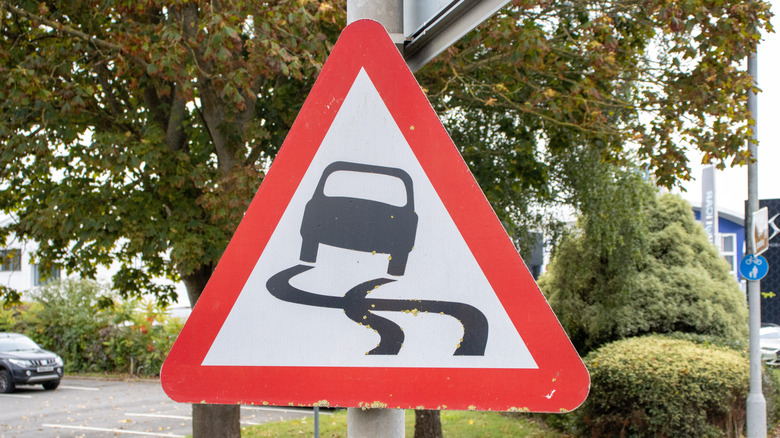Why You Should Avoid Pumping Your Brakes During An Emergency Stop
The need to stop a moving car quickly is a situation most drivers would choose to avoid. It's also a situation that almost every driver will eventually face in their years at the wheel of a car, truck, or SUV. Of course, if there's any solace to be found in that fact, it's that modern cars are outfitted with more safety features these days than, arguably, at any point in automotive history.
Nonetheless, when the time inevitably comes for you to stop your vehicle quickly, you'll still need to take action by pressing the brake pedal. That being said, we'd wager that, at some point in the course of your driver's training, you heard someone say that one of the best things you can do when you need to stop a speeding vehicle as fast as possible is to pump the brakes. It's just as safe to assume that the person who gave you that tip was on the older side, as pumping the brakes is a dated term applied to older vehicles.
Pumping the brakes was once an effective way for drivers to maintain control over a vehicle in an emergency stop, as it might prevent the brakes from locking up and putting the vehicle into a skid or spin. However, the development of the ABS or Anti-Lock Braking System has made the tactic obsolete. In fact, it's made pumping the brakes more of a danger than a safety practice.
How ABS effects your braking method
If you're curious as to whether your vehicle is equipped with Anti-lock Brakes, there may be an illuminated in-dash light telling you so. Likewise, the inclusion of ABS has been mandatory on new builds for more than a decade now. For those who don't know how ABS works, it essentially pumps the brakes for you when you put excessive pressure on the brake pedal, thus preventing them from locking up in an emergency and potentially even shortening the vehicle's stopping distance.
Now that ABS does the pumping, you probably see why pumping yourself could be an issue. Primarily, doing so could send mixed signals to your vehicle's braking system and prevent it from properly engaging when you need it to. Pumping the brakes on a vehicle with ABS may actually increase your chances of skidding or spinning out. And yes, even in a vehicle with disc brakes, the action could be dangerous, potentially leaving your brakes to lock up faster.
Given those facts, you might now be wondering what the best practice is when you need to get your vehicle stopped quickly, but also safely. Assuming your car, truck, or SUV has ABS, you'll simply need to remove your foot from the gas, then press the brake pedal firmly and let the ABS do its thing. In vehicles with no ABS, "threshold braking" is best. That means you should press the brake firmly, and if you feel a skid happening, briefly lighten the pressure and reapply.

